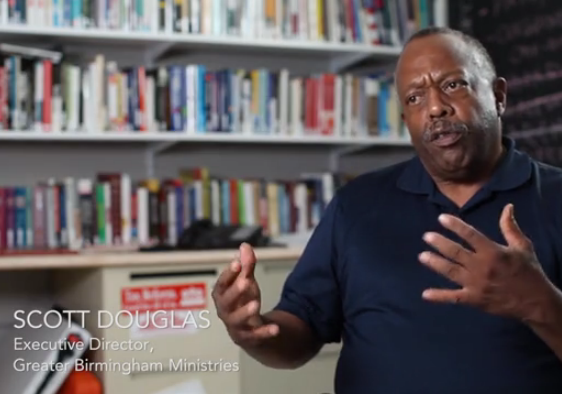Overcoming fear: Lessons from the South

Scott Douglas, executive director of Greater Birmingham Ministries, says that unless we challenge the lies of racial superiority people will continue to use the fear it generates to block progress. (Image is a still from the video below.)
The Mary Reynolds Babcock Foundation funds organizations in the South working to move people and places out of poverty. The foundation recently launched a "Southern Voices" oral history project to capture the stories of Southern leaders working for social and economic justice. The latest installment features stories about organizers' experiences with racism and their efforts to conquer it; the interviews were conducted before the church shootings in Charleston. For more stories from the project, click here. (Disclosure: The Mary Reynolds Babcock Foundation is a funder of the Institute for Southern Studies.)
* * *
An attempt to start a race war in America is backfiring in vibrant fashion. People of all backgrounds are mourning nine black parishioners who welcomed a white supremacist into their Bible study at Charleston's Emanuel AME Church, a hallowed shrine to freedom, equality and inclusion. The congregation is overwhelmed by the condolences and donations pouring in from every state. Thousands packed the Ravenel Bridge (named for a vehement defender of the Confederate flag) singing "This Little Light of Mine" to the accompaniment of boat and car horns.
The hate crime is drawing comparisons to the 1963 bombing of Birmingham's 16th Street Baptist Church. In his eulogy for the four little girls killed in that explosion, Dr. Martin Luther King, Jr. said: "They are the martyred heroines of a holy crusade for freedom and dignity. … They say to each of us, black and white alike, that we must substitute courage for caution. They say to us that we must be concerned not merely about who murdered them, but about the system, the way of life, the philosophy which produced the murderers."
Indeed, that horrific attack marked a turning point in the civil rights movement. The national outrage it garnered prompted Congress to pass the Civil Rights Act the following year. Similarly, the atrocity in Charleston is pulling back the curtain on racism in the U.S. and sparking a dialogue about how to address it. If history is our teacher, lasting good will surely come of the tragedy.
There are countless examples of champions who swapped caution for courage after experiencing the sting of racism first-hand. Southwest Georgia Project Founder Shirley Sherrod is one of them. "In 1965, my father was murdered by a white farmer in Baker County who was not prosecuted," Sherrod said. "That summer, I was trying to register to vote and every time I attempted to do so the sheriff would be there to push me out of the courthouse."
Efforts to keep Sophia Bracy Harris and her siblings out of school cemented her devotion to early childhood education. Harris' sister was arrested, and when the Justice Department intervened, the family's home was firebombed. "Moving on from that experience and what it was like to be displaced for 15 months, living in a two-room hay shack — 10 of us, that was the size of our family — the feeling of injustice and violation was strong, the sense of the treatment that we got at the school with teachers and people who we were taught to respect." Harris went on to establish the Foundation of Child Care Centers of Alabama and still serves as its executive director.
Southern Echo Founder and President Hollis Watkins traces his sense of duty to a segregated Mississippi childhood: "I had to walk to school while white children on the bus rode by, splashed mud and water on us. We couldn't ride the bus. We could not go to the same school they went to. The equipment, the books and everything that we had at the school, were hand-me-down books. When they became obsolete for the white children, they were passed to us. I knew something was wrong with that. I didn't know exactly what. And I began to question people in general. I began to question God as to why He would allow such things to take place. As a part of that process, my father said to me once, 'Son, you always stand up for what's right, even if you're the only one standing.'"
The ubiquity of injustice also transformed many whites into devoted allies. "One defining moment of my political education in Louisville, Kentucky was when a case that came to be referred to as 'The Black Six' happened, when six people who just happened to be leaders in the Civil Rights Movement — all of them African American — were formally charged for conspiracy to blow up the oil refinery," said former Statewide Organizing for Community Empowerment Executive Director Maureen O'Connell. "Ruth Bryant, who was the mother of one of the young women I taught in the school ... lived across from the oil refinery. She would have been blowing up her own house! And there was something that shocked me: Oh my gosh! The police aren't everybody's friends. You can be falsely accused because you're black."
Industrial Areas Foundation Supervisory Organizer Perry Perkins recalls the risks involved in standing up to intolerance. "I grew up where race was just in your face," said the Greenwood, Mississippi, native. "Fear was at the center of how segregation was maintained. And it was not just intimidation of black folk; it was intimidation of anybody that would dare speak out."
As the massacre in Charleston has shown, those attitudes are not a thing of the past; they're the daily reality, particularly in the South. "Here in McIntosh County, the largest prevailing issue that we deal with is racism," said McIntosh SEED Senior Managing Director Cheryl Peterson. "You would think that would be something that would be associated with the '60s, all of that civil disobedience, but it is still prevalent here in our community and it's prevalent in a lot of places of high poverty."
Modern bigotry is the reason some organizations still emphasize racial healing. "What we've found is that, especially in the rural areas, not much has changed socially," said former Southwest Georgia Project Business Development Specialist Daa'iyah Salaam. "You have, literally, black people on one side of the railroad tracks and white people on the other ... and they do not co-mingle at all. Most of the white children are sent to private schools, most of the black children are in public schools. ... People accept things as the way they are. So our racial healing program seeks to help bridge some of that."
Greater Birmingham Ministries Executive Director Scott Douglas points to lessons from the 16th Street Baptist Church. "Both the Civil Rights Act and the Voting Rights Act can literally be traced to the Birmingham movement of 1963," Douglas said. "But unless we can challenge the mythologies of, the lies of racial superiority, the fears that accompany that, the fearmongerers ... who use that weapon of fear and suspicion to drive wedges between good folk, no matter what their color, until we can overcome that fear and such, we won't make much progress."
